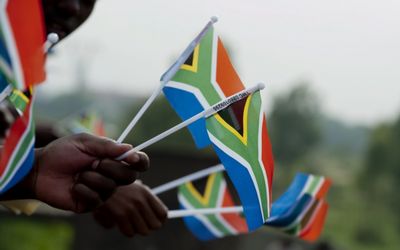From skunk to darling of the world and back we go again
by Onkgopotse JJ Tabane,
2016-03-22 05:40:20.0
THIS year’s Human Rights Day came at a time when SA is hardly a beacon of light as an upholder of human rights. In many ways, we are fast going back to being the skunk of the world, where our human rights record, and those of our friends abroad, are hardly a gold standard.
One would never have thought that as a country that benefited from international solidarity to defeat a crime against humanity, we would be so nonchalant about human rights within two decades. It is a sad day when you look at what we have become since the demise of our global icon Nelson Mandela, who must be turning in his grave.
A good place to start is with the recent court ruling that educated us about our international legal obligations in relation to the International Criminal Court (ICC). When the court was established, we rushed to domesticate that law and the ruling party at that time pronounced in fine-spun language in front of all the world that our country would never again be a haven for war criminals wanted by the international community.
How shameful that a few short years later, the same speeches are being read back to the governing party by the opposition in Parliament, the judiciary as well as civil society, who have grabbed the moral high ground from under its feet.
When the law domesticating the supremacy of the ICC was passed, Sudanese President Omar al-Bashir had already overseen the murder of thousands of people in his country. In fact, as a result of this, we uninvited him from the inauguration of our new president at the time, out of a sense of both morality and respect for the laws we had just committed ourselves to.
Fast-forward to 2016 and we find ourselves with a court judgment that should see state officials charged with contempt. It might be forgivable if this were an isolated incident of an inadvertent disrespect for human rights and the Constitution, but it is not. We are developing a habit of siding with skunks. Our stance on the Middle East conflict also leaves much to be desired. Instead of playing a role of mediator and facilitator of peace, we have decided to take sides in the conflict, influenced not by principle but by a misguided historical loyalty to Yasser Arafat. Snubbing our noses at the international community, the governing party has hosted Hamas in SA, killing any prospect we may have had of being seen as an independent peace broker.
This type of action confirms a long-held suspicion that the government is experiencing a drought of ideas about how to be useful in the international arena in terms of peace-making.
Ironically, the reason given for welcoming Bashir with open arms is that SA supports the brokering of a peaceful solution to regional conflicts, and that this must include the president of Sudan. Yet, at the same time, the African National Congress demands that its members and government not visit Israel — a clear rebuff of one of the parties to a conflict we should be helping to resolve.
When you take these incidents and add the way we voted on the Libya issue at the United Nations, resulting in the murder of Muammar Gaddafi by the West, as well as how we turned a blind eye to Ugandan President Yoweri Museveni’s draconian laws against gays and lesbians, you realise just how far we have fallen from the days of being an icon for human rights in the world. The denial of a visa to the Dalai Lama summed up what matters to us these days — we would rather be on the side of those who might butter our bread than of those who are oppressed and downtrodden.
Archbishop Emeritus Desmond Tutu said it all: "Watch out, the National Party had a huge majority (among the white electorate), but they bit the dust. Watch out."
I add my voice to his on behalf of all those who died fighting for human rights in SA.
• Tabane anchors Power Perspective on Power FM

Picture: GALLO IMAGES/LISA HNATOWICZ
THIS year’s Human Rights Day came at a time when SA is hardly a beacon of light as an upholder of human rights. In many ways, we are fast going back to being the skunk of the world, where our human rights record, and those of our friends abroad, are hardly a gold standard.
One would never have thought that as a country that benefited from international solidarity to defeat a crime against humanity, we would be so nonchalant about human rights within two decades. It is a sad day when you look at what we have become since the demise of our global icon Nelson Mandela, who must be turning in his grave.
A good place to start is with the recent court ruling that educated us about our international legal obligations in relation to the International Criminal Court (ICC). When the court was established, we rushed to domesticate that law and the ruling party at that time pronounced in fine-spun language in front of all the world that our country would never again be a haven for war criminals wanted by the international community.
How shameful that a few short years later, the same speeches are being read back to the governing party by the opposition in Parliament, the judiciary as well as civil society, who have grabbed the moral high ground from under its feet.
When the law domesticating the supremacy of the ICC was passed, Sudanese President Omar al-Bashir had already overseen the murder of thousands of people in his country. In fact, as a result of this, we uninvited him from the inauguration of our new president at the time, out of a sense of both morality and respect for the laws we had just committed ourselves to.
Fast-forward to 2016 and we find ourselves with a court judgment that should see state officials charged with contempt. It might be forgivable if this were an isolated incident of an inadvertent disrespect for human rights and the Constitution, but it is not. We are developing a habit of siding with skunks. Our stance on the Middle East conflict also leaves much to be desired. Instead of playing a role of mediator and facilitator of peace, we have decided to take sides in the conflict, influenced not by principle but by a misguided historical loyalty to Yasser Arafat. Snubbing our noses at the international community, the governing party has hosted Hamas in SA, killing any prospect we may have had of being seen as an independent peace broker.
This type of action confirms a long-held suspicion that the government is experiencing a drought of ideas about how to be useful in the international arena in terms of peace-making.
Ironically, the reason given for welcoming Bashir with open arms is that SA supports the brokering of a peaceful solution to regional conflicts, and that this must include the president of Sudan. Yet, at the same time, the African National Congress demands that its members and government not visit Israel — a clear rebuff of one of the parties to a conflict we should be helping to resolve.
When you take these incidents and add the way we voted on the Libya issue at the United Nations, resulting in the murder of Muammar Gaddafi by the West, as well as how we turned a blind eye to Ugandan President Yoweri Museveni’s draconian laws against gays and lesbians, you realise just how far we have fallen from the days of being an icon for human rights in the world. The denial of a visa to the Dalai Lama summed up what matters to us these days — we would rather be on the side of those who might butter our bread than of those who are oppressed and downtrodden.
Archbishop Emeritus Desmond Tutu said it all: "Watch out, the National Party had a huge majority (among the white electorate), but they bit the dust. Watch out."
I add my voice to his on behalf of all those who died fighting for human rights in SA.
• Tabane anchors Power Perspective on Power FM























Change: -0.47%
Change: -0.57%
Change: -1.76%
Change: -0.34%
Change: 0.02%
Data supplied by Profile Data
Change: -1.49%
Change: 0.09%
Change: -0.47%
Change: 0.00%
Change: -0.02%
Data supplied by Profile Data
Change: 0.48%
Change: 0.91%
Change: 0.38%
Change: -0.15%
Change: 0.93%
Data supplied by Profile Data
Change: 0.25%
Change: -0.32%
Change: 0.33%
Change: -1.22%
Change: -1.41%
Data supplied by Profile Data